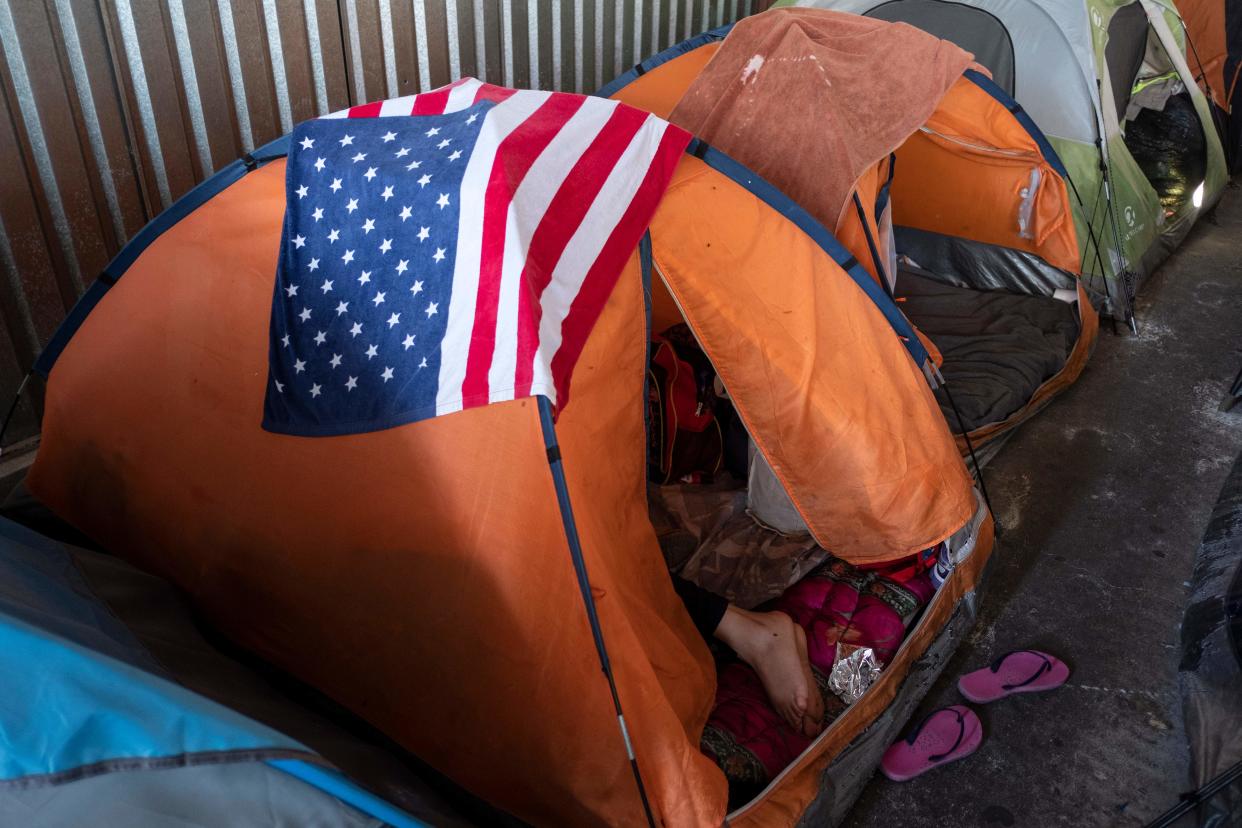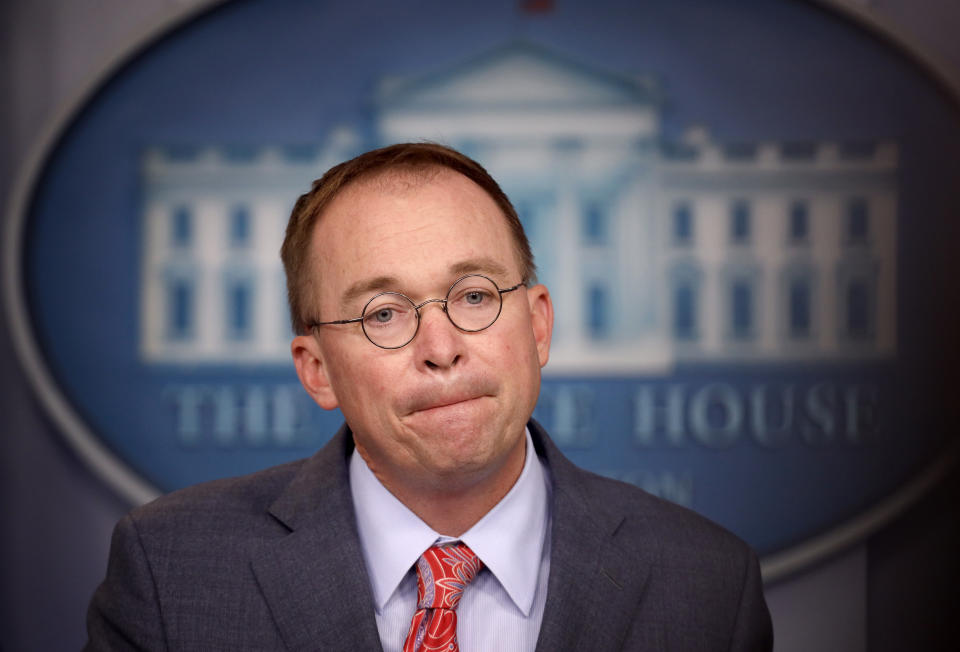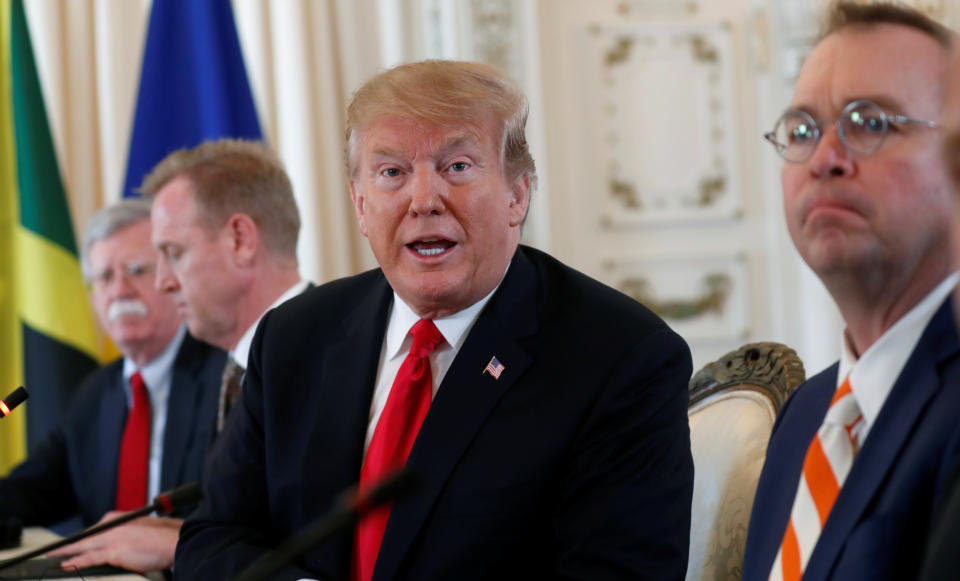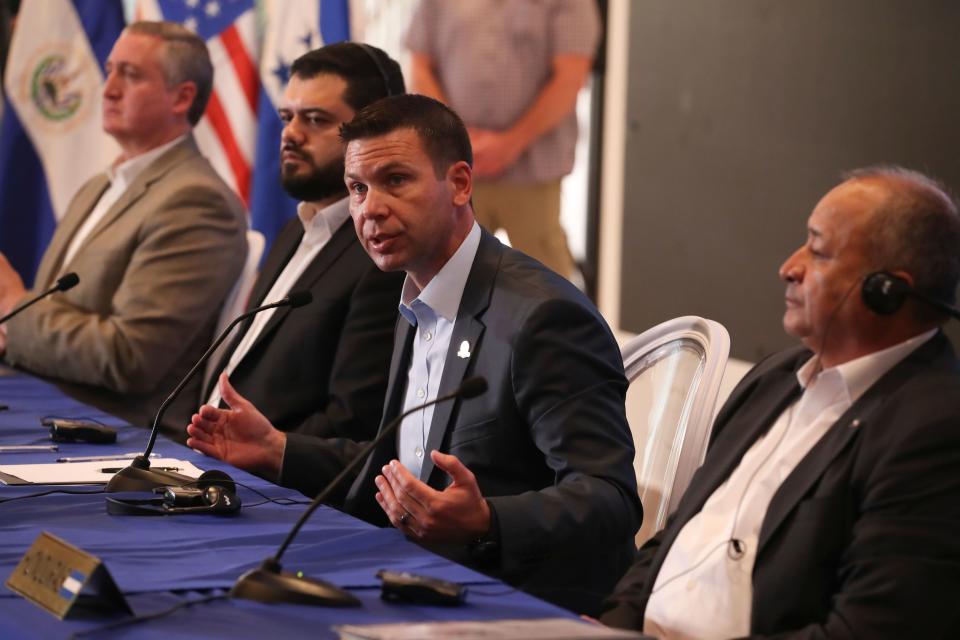On withholding aid to Central America, Mulvaney was correct: 'We do that all the time'

During a now infamous press briefing last week, acting White House chief of staff Mick Mulvaney attempted to make the case that the White House’s decision to withhold military funds from Ukraine was neither improper nor any different from the Trump administration’s ordinary negotiations with foreign governments.
Mulvaney has since tried to walk back comments that seemed to acknowledge a “quid pro quo” offer to release the aid in exchange for Ukrainian government help in publicizing a conspiracy theory that Trump and his lawyer, Rudy Giuliani, have been promoting about the 2016 election.
But Mulvaney also confirmed that the administration is in the habit of using foreign aid to coerce compliance with U.S. policy. “We do that all the time,” he said. “We were holding up money at the same time for, what was it, the Northern Triangle countries. We were holding up aid at the Northern Triangle countries [Guatemala, Honduras, El Salvador] so that they would change their policies on immigration.”
Other presidents have done the same, although Stephen McFarland, the former U.S. ambassador to Guatemala and a 37-year veteran of the U.S. Foreign Service, described the Trump administration as exceptionally “transactional” and “short-sighted.”
More important, in McFarland’s view, is that the concessions sought from Ukraine weren’t to advance U.S. foreign policy goals, but Trump’s personal interest in disputing Russian help with his election and discrediting former Vice President Joe Biden. The administration has consistently cast the issue as one of combating “corruption,” but the specific assistance it sought dovetails with Trump’s political agenda.
“First of all, Mulvaney was conflating regular diplomacy, where you engage in combination of persuasion, cajoling, sometimes pressure to advance United States security objectives, with doing the same stuff to advance the president’s reelection,” said McFarland. “That’s the difference, and it’s a big difference.”
Unlike what Trump and his allies appear to have been pushing for in Ukraine, McFarland continued, the migration agreements forged by the Trump administration in Central America constitute a legitimate foreign policy matter, “no matter how much you disagree with them.”

Although the specific details of the agreements and how they will be implemented haven’t been announced, their stated objective is to reduce the flow of asylum seekers from Central America to the U.S.-Mexico border by requiring that migrants who cross into one of the three countries request asylum there before continuing to the United States. The policy has been criticized by human rights advocates and regional experts, including McFarland, who doubts that the three nations, whose own citizens make up the majority of the asylum seekers already, have the resources to provide security and shelter to tens of thousands of additional migrants, especially those fleeing gang violence just over the border.
Not only are the agreements themselves flawed, but McFarland and others argue that some of the tactics used to secure them — including the withholding of aid cited by Mulvaney — reflect a serious disregard for regional conditions, and a disregard of long-term U.S. interests in exchange for immediate gains.
“This is an administration whose foreign policy is exceptionally transactional,” said McFarland. “That’s not to say that other administrations don’t have some aspects of being focused on short-term or having transactions, but this one is really way out there in those terms.”
“I think part of it,” he continued, is meant to show that the administration “followed through on campaign pledges.”
One of Trump’s most important promises was to cut illegal immigration. He has been thwarted in part by hundreds of thousands of migrants, largely families and children, who have traveled from Central America over the last two years to seek asylum in the United States. After a number of public threats by the president to cut off U.S. assistance to the Northern Triangle nations, in the face of warnings that doing so would likely drive more migration not lessen it, the State Department announced in late March that it was “carrying out the President’s direction and ending FY (fiscal year) 2017 and FY 2018 foreign assistance programs for the Northern Triangle.” The move was estimated to affect more than $500 million that had been appropriated by Congress for programs designed to combat the root causes of migration from those countries.
“We’re not paying them anymore because they haven’t done a thing for us,” Trump told reporters ahead of the official announcement, reiterating frustrations over what he has viewed as those governments’ failure to stop the recent mass exodus of their own citizens, and even claiming that the countries had “set up” caravans to send migrants to the U.S.
When the cuts took effect in June, a State Department spokeswoman told reporters that none of the funding would be restored until the administration believes that the countries have taken sufficient action to reduce the number of migrants from the region arriving in the U.S.
In general, “President Trump is not a big fan of foreign aid,” Mulvaney said, citing suspicions of misuse by corrupt governments.

“Have we threatened to cut off assistance before? Yeah,” said McFarland, whose foreign service work primarily was primarily focused on countries either in the midst of conflict or recovering from it, in Central and South America and the Mideast.
He recalled a few examples from his time as a political counselor at the U.S. Embassy in El Salvador, from 1988 to 1990, when simply threatening to cut military and economic assistance were successful in persuading the Salvadoran government to crack down on military “death squads” targeting leftists.
But, he says, in the current situation “cutting off the assistance isn’t a lever,” because the aid doesn’t actually go to the governments whose cooperation Trump is seeking, and cutting it is actually counter-productive to U.S. policy goals.
Contrary to President Trump’s apparent understanding of how foreign aid is distributed, most economic aid provided by the U.S. is not transmitted directly to governments but is channeled through third parties (non-profits, non-governmental organizations, public-private partnerships and multilateral organizations like the World Bank and the United Nations) for specific projects intended to advance the interests of the U.S. as well as the country in which its delivered. In the case of Central America, American assistance was part of a comprehensive effort to address the causes of increased migration, from Northern Triangle countries in particular. The policy was begun by the Obama administration in 2015, with bipartisan support in Congress.
Over the past four years, Congress has appropriated $2.6 billion to the region under strict conditions that required the governments of Guatemala, Honduras and El Salvador to prove they are actively addressing a range of specified issues including border security, drug smuggling, political corruption and human rights.
Even then, most of that assistance is directed not to the governments themselves but to organizations tackling the systemic problems driving citizens of these countries to flee, including gang violence, police abuses and widespread political corruption.
“If the end goal is to help these countries improve conditions, it’s hard to understand why the cutoff of assistance to these programs is going to help in any way,” said Adriana Beltrán, director for citizen security at the Washington Office on Latin America, a research and human rights advocacy organization.
Beltrán said the Trump administration’s actions in Central America seem more designed “to address the whims of the White House” and to “respond to President Trump’s anti-immigrant policies than to figure out how [to] work with Central America to address the different factors that are driving people to have to flee their communities in the first place.”
“Even for the Trump administration’s own migration policy, not that I agree with it, but if you want to implement it, the last thing you want to do is cut off the assistance,” said McFarland. “[It] doesn’t send the message that we’re tough, it sends the message that we can’t even think through how to support our own stated foreign policy.”

In a tweet last week, Trump praised Guatemala, Honduras and El Salvador for signing “historic asylum cooperation agreements,” and announced that, “to further accelerate this progress, the U.S. will shortly be approving targeted assistance in the areas of law enforcement & security.”
“Nobody in their right mind would say Guatemala, Honduras, and El Salvador are safe third countries. They’re not,” said Juan González, former deputy assistant secretary of state for Western Hemisphere affairs during the Obama administration.
González said that the asylum agreements as well as the cutting and redirecting of assistance to these countries are decisions “motivated by politics, not policy, or what independent experts have said is the proper approach.”
González agrees that security assistance is necessary for U.S. interests in Central America, and that “it’s good to debate how to implement aid most effectively.” But as for cutting development altogether, he says, even most Republicans would admit that “long-term, this is only going to make the situation worse.”
Download the Yahoo News app to customize your experience.
Read more from Yahoo News:



